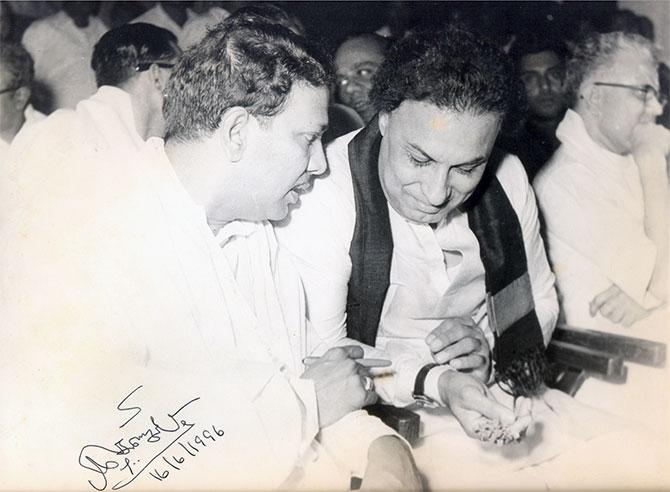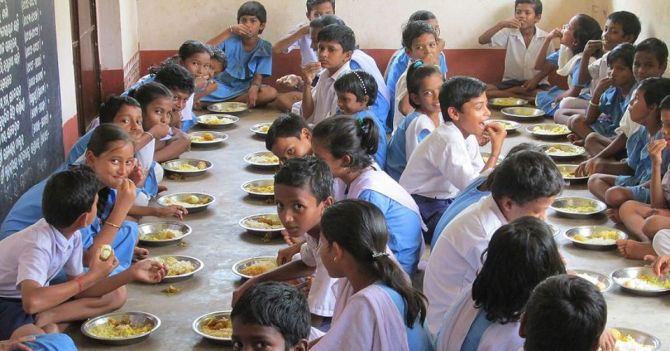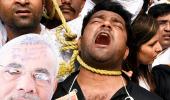It is not unlikely that ahead of the Lok Sabha elections, the BJP government comes up with more imaginative schemes aimed at constituency-building.
The party under Modi's leadership has a more modern thinking in such matters unlike its rivals, which are still steeped only in ideology, points out N Sathiya Moorthy.

Even as Rahul Gandhi's disqualification has caused the Opposition to come closer than was possible before in the name of democracy, there is an urgent need for them all to realise that these, as also hardcore Hindutva politics that the ruling Bharatiya Janata Party at the Centre promotes and propagates periodically and deliberately are only a front for Prime Minister Narendra Modi to divert their attention from the achievements of his 'Achche Din' campaign slogan from his 2014 Lok Sabha poll campaign.
The fact is that the government at the Centre has rolled out very many social welfare programmes that have a lasting impression that the failures of the Modi leadership on demonetisation and the exodus of hundreds of thousands of migrant labour across the country following the overnight Covid lockdown were easily overcome. Or, that is the electoral reality, election after election, state after state.

The Opposition, particularly the Congress, the BJP's rival at the national-level, will only have to recall its fortune in 2004, when Sonia Gandhi's 'Aam Aadmi' call simply devoured the well-coined ruling BJP's 'India Smiling' campaign without anyone realising. The message then and now is clear.
The losing leaders and their political parties or combines had lost touch with ground realities and the voter's priorities, which yet, went beyond 'Lutyens' Delhi', as the Sangh Parivar has not been tired of branding old-world elites who have not embraced their brand of 'nationalism', at least not yet.
Yet, the Dravidian parties in Tamil Nadu, or even the post-Independence Congress rulers of the state, then called Madras, from whom the former usurped political power through democratic elections, can claim that what the Modi government is doing now are all successful programmes that they had introduced in the state from the mid-1950s. They can even chide the prime minister for yet condemning all welfare schemes other than that he has attested and adopted at the national-level as freebies or revadi.
For north Indian voters who had not known that such schemes existed elsewhere in the country and they were the last ones to benefit from the same, those freebies have been helpful.
Those freebies in most cases know no religion or caste. Poverty is universal to castes and religion in the country, even as a proportion to the individual population of each. So, freebies work.

Just as the voters in Dravidian Tamil Nadu have stuck with the two mainline parties, namely the DMK and the AIADMK, owing to the socio-economic benefits that they have acquired through the decades since the advent of the Justice Party government in the then Madras Presidency a hundred years ago, it now the turn of the people up north to celebrate their new-found prosperity, revadi or not.
In a way, the post-Independence Congress regimes, or what is called the 'Nehruvian model' did it all in its time, but did not move with the times, and improve upon the original. It targeted the lowest socio-economic denominator, namely, the SC-ST communities, and other politically-vulnerable communities, which comprised the nation's minorities at Independence, both for reasons steeped in contemporary history.
The fall side of the Gandhian scheme for social uplift which the Nehruvian model implemented diligently through imaginative programmes was that it side-stepped the intermediary castes across the board.
Like the Muslim community that felt alienated with the advent of the British rulers, the intermediary communities were militant and included the erstwhile ruling class whom the Islamic invaders had violently replaced centuries earlier.
The post-Independence programme was thus a double-slap on their face, as they also found the newly-empowered Dalit communities getting a voice and identity that had not been there for millennia under the prevailing Indian scheme of scriptures and practice.
Across north India in particular, they found a new political identity, all of which merged in the Janata Party, when founded to take on the ruling Congress's might, post-Independence.
Incidentally, the touchstone Dravidian model had gone through it all decades earlier. The Justice Party was founded by the non-Brahmin elite of the time.
Once its limited goal of religion/casted-based reservations was in place, it began losing relevance to the more appealing Independence call of the Congress rival, which had confined its early support-base to the upper caste Brahmins on the one hand and the Harijans on the other.
Post-Independence, the ruling Congress party could not but have taken up the Justice Party's welfare manifesto to the next and more practical stage. The rest, as they say, is history.
The slack in the Dravidian model in the 1980s and 1990s because they had concluded that they had fulfilled their social welfare agenda while in power since 1967 in Tamil Nadu, fuelled the hope of national parties, namely the Congress first and the BJP later.
It meant that the Dravidian parties made reality checks and expanded the scope and reach of their socio-economic programmes to cover the nation as a whole, so as to include contemporary ideas of social sector support.

Thus, free education up to the school level expanded to include collegiate education, entailing the opening of more colleges, hence universities, revival and institutionalisation of free noon-meal scheme, later graduating to free bicycles and laptops for Plus-2 students, Scooty for female students, free cooking gas connection and stove, as the GenNext women were spending more time at non-farming work than at home.
With the focus exclusively on women, cutting across caste and religion, Tamil Nadu introduced systemised medical check-up and post-delivery gift-hampers to pregnant women and new-borns, to ensure a health and well-being of future generations.
Today, it's a free ride for the state's womenfolk in all short-distance 'city buses'.
The widespread concern in the state, going beyond the politics of it, against NEET is that the state's poor who could not afford private tuitions at high cost could not make it to medical colleges, and over time, the state would suffer for want of medical doctors to serve the rural poor. At present, Tamil Nadu has four doctors per thousand people, on par with Nordic countries.
It is not as if Modi's Centre has not understood this dichotomy. But it is just beginning where Tamil Nadu, for instance, or neighbouring Kerala, had started decades earlier. The present BJP leadership seems convinced that it is for their future generations to worry about, care about.
Just now, they need to strike a societal balance in electoral terms.
When the poor in the country get their freebies, the urban middle class, the real and imaginary concerns of the loyal constituency of the party for decades, especially in north India, too have to be addressed in ways they understand. It does not necessarily mean that it is going to remain this way.
In its time, when the aspirational communities up north, too, develop the kind of urge to grow, as in some of the south Indian states, for instance, political leaderships and governments of the day would begin think differently.
They may be tempted to look at south India of the past, or could outdo them by being more contemporary as the Modi leadership now is -- without any baggage of history.
It is not unlikely that ahead of the Lok Sabha elections next year, the BJP government at the Centre comes up with some more imaginative schemes aimed at constituency-building or retaining whatever.
The party under Modi's leadership has a more modern thinking in such matters, unlike its rivals, both national and regional, which all are still steeped only in ideology.

In Modi's politics, ideology is at a higher plane, in ways far removed from practicality, as it is easy to sustain the momentum, as a 'unifying force' within the diversity that is India.
For his rivals, who met in Delhi on Monday, April 3, 2023, to take forward the DMK initiator's 'Social Justice' agenda to the national-level, it is ideology that unites them and divides them, all the same.
For instance, the Samajwadi Party and Bahujan Samaj Party in Uttar Pradesh shy away from each other only because of their respective ideological identity wedded to individual castes. Modi's Hindutva unites them all, though against a fictitious enemy, who is easy to touch, feel -- and lynch -- and thus, keep the pot boiling.
It is the same case with the Opposition's unity over democracy issues, which may be real from their perspective, but they need to constantly verify the ground support.
This, even the BJP and Modi leadership, too, should do, in the context of larger anti-incumbency that invariably afflicts an unchallenged leadership.
The real issues and divisions within the Opposition would come up when they sit down to draw a common manifesto, pre-poll. It implies that a 1996 model of post-poll combine with a common intention would serve them better than a pre-poll agenda-setting alliance.
At the same time, Modi as an Emergency-warrior should not forget the lessons of 1977. In the Lok Sabha elections that year, the poor and illiterate voters demonstrated to the world that there was more to a human being than food and polluted air.
It was not restricted to the Muslim community, which alone suffered the ignominy of the dreaded 'nasbandi', or forced sterilisation of the late Sanjay Gandhi!
N Sathiya Moorthy, veteran journalist and author, is a Chennai-based policy analyst and political commentator.










